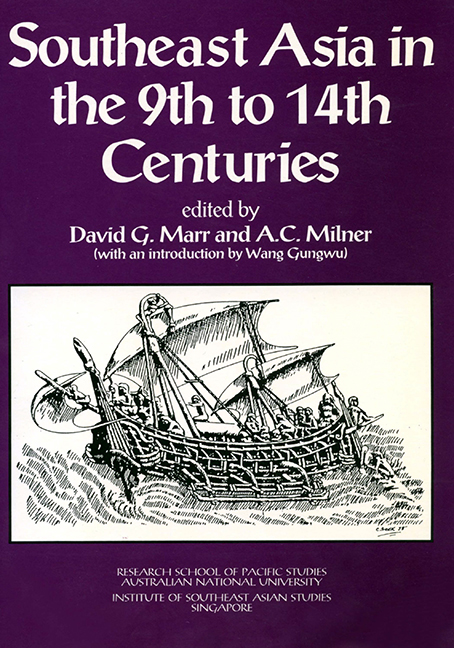Book contents
- Frontmatter
- Contents
- Contributors
- Preface
- Introduction
- 1 The Early and the Imperial Kingdom in Southeast Asian History
- 2 Hydraulic Works and South East Asian Polities
- 3 Some Notes on Relations between Central and Local Government in Ancient Java
- 4 Negara, Mandala, and Despotic State: Images of Early Java
- 5 Some Remarks on Early State Formation in Cambodia
- 6 “Elephants Can Actually Swim”: Contemporary Chinese Views of Late Ly Dai Viet
- 7 Authority and Legitimacy in 11th Century Vietnam
- 8 From Myth to History: Imagined Polities in 14th Century Vietnam
- 9 Shipshape Societies: Boat Symbolism and Political Systems in Insular Southeast Asia
- 10 Changing Perspectives in Island Southeast Asia
- 11 Political and Cultural Continuities at Dvaravati Sites
- 12 The True and the Corbel Arch in Mainland Southeast Asian Monumental Architecture
- 13 Vietnamese Ceramics and Cultural Identity: Evidence from the Ly and Tran Dynasties
- 14 Traditions, Acculturation, Renovation: The Evolutional Pattern of Vietnamese Culture
- 15 Symbolism of Kingship in Arakan
- 16 Buddhism in Champa
- 17 The Ordering of Generations: Change and Continuity in Old Javanese Kinship
- 18 Sources on Economic Activities in Khmer and Cham Lands
- 19 Narrative Bas-Reliefs at Candi Surawana
- 20 Possibilities for a Reading of the 1293-1357 Period in the Vietnamese Annals
- Index
- Miscellaneous Endmatter
Introduction
Published online by Cambridge University Press: 21 October 2015
- Frontmatter
- Contents
- Contributors
- Preface
- Introduction
- 1 The Early and the Imperial Kingdom in Southeast Asian History
- 2 Hydraulic Works and South East Asian Polities
- 3 Some Notes on Relations between Central and Local Government in Ancient Java
- 4 Negara, Mandala, and Despotic State: Images of Early Java
- 5 Some Remarks on Early State Formation in Cambodia
- 6 “Elephants Can Actually Swim”: Contemporary Chinese Views of Late Ly Dai Viet
- 7 Authority and Legitimacy in 11th Century Vietnam
- 8 From Myth to History: Imagined Polities in 14th Century Vietnam
- 9 Shipshape Societies: Boat Symbolism and Political Systems in Insular Southeast Asia
- 10 Changing Perspectives in Island Southeast Asia
- 11 Political and Cultural Continuities at Dvaravati Sites
- 12 The True and the Corbel Arch in Mainland Southeast Asian Monumental Architecture
- 13 Vietnamese Ceramics and Cultural Identity: Evidence from the Ly and Tran Dynasties
- 14 Traditions, Acculturation, Renovation: The Evolutional Pattern of Vietnamese Culture
- 15 Symbolism of Kingship in Arakan
- 16 Buddhism in Champa
- 17 The Ordering of Generations: Change and Continuity in Old Javanese Kinship
- 18 Sources on Economic Activities in Khmer and Cham Lands
- 19 Narrative Bas-Reliefs at Candi Surawana
- 20 Possibilities for a Reading of the 1293-1357 Period in the Vietnamese Annals
- Index
- Miscellaneous Endmatter
Summary
For several decades non-Western history has attracted a new breed of historian, who accepts that an interdisciplinary approach is essential to the study of the past. The traditional historian, who depends primarily on archival records, has of course accepted this approach when normal sources prove inadequate to deal satisfactorily with all the complex features of the past. For most modern periods, however, an interdisciplinary approach has had little appeal to the historian already faced with a superfluity of material in large and orderly archives. Only when it comes to the non-Western past has it been conceded that interdisciplinary studies might be necessary.
Pre-colonial Asia, Africa and the Americas, sadly without archives, could not be studied by historians at all without the help of other kinds of scholars. For this reason, most of the best-trained professional historians in the West either ignored the non-Western world entirely or limited themselves to the history of Western settlement or Western imperial and colonial enterprises outside Europe. The non-Western past was impossible to study by conventional historical methods because much of that past was by definition unhistorical. It consisted largely of exotic if not esoteric materials gathered by travellers, discoverers, missionaries, colonial administrators, even merchantadventurers, and ultimately systematically recorded and explained by professional ethnographers and, for Asia and North Africa, by orientalists.
Despite questions about their dubious origins in Western expansionist history, both ethnographers and orientalists are descended from a highly respectable group of scholars, the classicists, whose broad, almost encyclopaedic tradition of learning may be traced back to the Greeks and Romans, the Arabs and then the Renaissance Europeans. The tradition still survives in some departments of classics in modern universities. Unfortunately, in recent times it has been regarded as a revered, but not greatly relevant, holistic approach towards knowledge, which may be still useful for the study of remote antiquity, but whose capacity to say anything new about that antiquity now depends mainly on the discoveries of the archaeologists.
However useful that classical tradition may have been in the past, it is not considered of much help for scholars today. The scholarly world increasingly believes that professional skills in well-established modern disciplines are essential at the frontiers of knowledge. This applies to the study of the past as much as to the study of contemporary problems.
- Type
- Chapter
- Information
- Southeast Asia in the 9th to 14th Centuries , pp. xi - xviiiPublisher: ISEAS–Yusof Ishak InstitutePrint publication year: 1986

